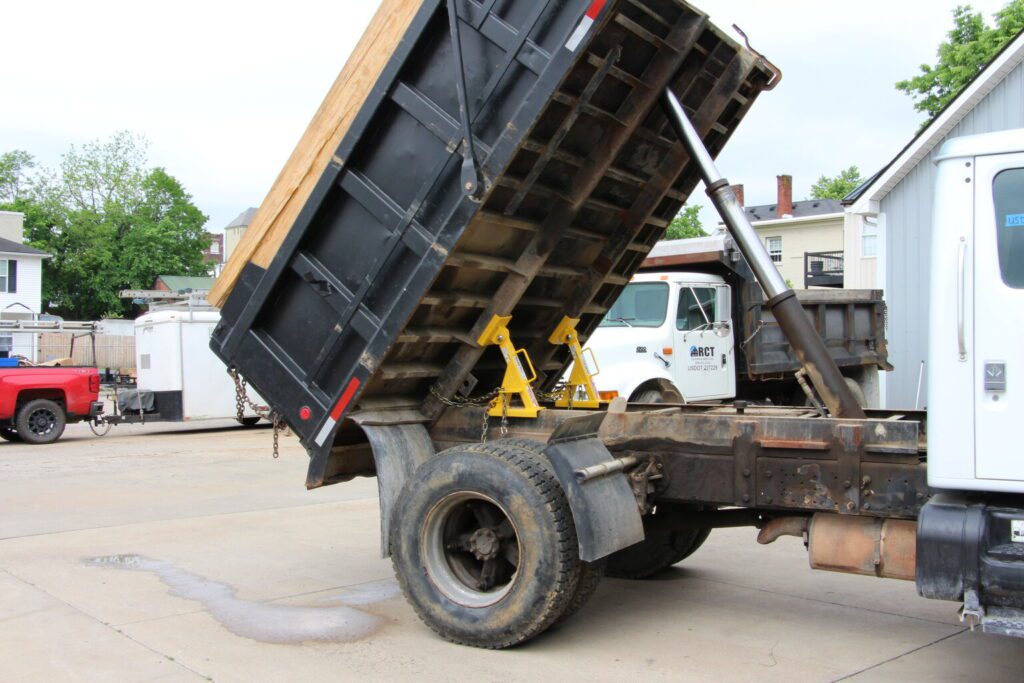In truck repair facilities, where the stakes are high and every task involves heavy machinery, accident prevention isn’t just a goal; it’s a necessity. From hydraulic failures to falling dump beds, the risks are real and ever-present. The good news? Most of these dangers are preventable with the right truck repair safety equipment. Whether you’re operating a small garage or a large commercial repair facility, the tools you stock can make the difference between a routine day and a catastrophic incident.
Here’s a practical checklist of essential equipment that every truck repair shop should have, starting with one of the most crucial: dump bed safety stands, also known as truck bed locks.
1. Truck Bed Locks: Your First Line of Defense
Relying solely on hydraulic systems when working under a raised dump bed is a recipe for disaster. Hydraulic failure can occur without warning, and without a physical lock to secure the bed, technicians are left dangerously exposed. That’s where truck bed locks come in.
Truck bed locks, like those offered by BedLock Safety Products, are engineered to support and secure dump beds during elevated maintenance. These safety stands physically block the bed from dropping unexpectedly, offering peace of mind and true protection. If your shop services dump trucks or similar heavy-duty vehicles, these are non-negotiable pieces of safety equipment.
2. Wheel Chocks: Stabilizing the Load
Even the best braking system can’t always guarantee a stationary vehicle during repair. Wheel chocks, wedged behind tires, prevent unwanted movement that could knock over tools, damage equipment, or harm workers. Look for heavy-duty rubber or urethane chocks with slip-resistant grips for maximum reliability.
3. Hydraulic Jack Stands: Supporting Heavy Loads
While hydraulic jacks are useful for lifting, they should never be used as the sole support. Jacks can fail or slowly leak, causing the vehicle to shift or collapse. Instead, always supplement them with certified jack stands capable of holding the vehicle's full weight during service.
4. Lockout/Tagout Kits: Electrical and Mechanical Safety
Lockout/Tagout (LOTO) procedures ensure machines and vehicles are safely de-energized before maintenance. With a comprehensive LOTO kit, technicians can isolate power sources and attach warning tags, reducing the risk of accidental startup—a major hazard in truck repair environments.
5. Personal Protective Equipment (PPE): Everyday Essentials
No safety checklist is complete without PPE. Each technician should be equipped with gear tailored to their tasks, including:
· Safety glasses or face shields
· Mechanic gloves
· Steel-toed boots
· Hearing protection
· Fire-resistant coveralls
PPE helps prevent injuries from debris, chemical exposure, and mechanical impacts—issues common in truck maintenance.

6. High-Lumen Work Lights: See What You’re Fixing
Poor visibility can lead to skipped safety checks and errors in repair. High-lumen, low-heat LED work lights help technicians work with precision, especially in dim engine bays or under vehicles. Choose battery-powered or corded models with durable, oil-resistant casings.
7. Emergency Spill Kits: Quick Response to Chemical Hazards
Truck repairs often involve oils, coolants, and other hazardous fluids. An emergency spill kit containing absorbent pads, gloves, and disposal bags ensures that your team can quickly contain and clean any leaks or spills, reducing slip risks and environmental harm.
8. Fire Extinguishers: Be Prepared for the Unexpected
Truck shops are high-risk environments for fires, as electrical systems and flammable materials are constantly used. Keep Class B and Class C fire extinguishers accessible and inspect them monthly. Ensure technicians are trained in their proper use and know their locations.
9. First Aid Kits: Immediate Injury Response
Even with all precautions in place, accidents can happen. Stock a comprehensive first aid kit with items such as burn ointment, antiseptic wipes, gauze, and splints. Prompt treatment of minor injuries can prevent complications and reduce downtime.
10. Safety Signage and Floor Markings: Visual Reinforcement
Sometimes, a simple sign can save a life. Use bold, well-placed signs to mark hazard zones, PPE requirements, and emergency exits. Reflective floor tape can help guide foot traffic and prevent slips or collisions in high-traffic areas.
Why It All Starts with BedLock Safety Products
Among all the tools listed above, truck bed locks stand out for their direct role in preventing life-threatening crush injuries. BedLock Safety Products specializes in dump bed safety stands that meet and exceed industry safety standards. Their products are:
· Tested for reliability under extreme conditions
· Trusted by mechanics nationwide
· Easy to install and maintain, reducing downtime
· Built with durable materials that ensure long service life
Whether your shop handles routine hydraulic repairs or full-scale truck servicing, investing in quality truck bed locks is a foundational step in creating a zero-incident culture.
Safety doesn’t happen by chance—it’s the result of deliberate planning, smart investments, and continuous training. By equipping your shop with the right truck repair safety equipment, including trusted dump bed safety stands, you’re not just meeting compliance—you’re protecting your team, your business, and your bottom line.
Start with the basics, but don’t stop there. Build a safety-first environment from the ground up, and ensure every technician has what they need to work without fear.
Looking for a reliable truck repair safety equipment manufacturer? Discover how BedLock Safety Products can upgrade your shop with industry-leading truck bed locks and dump bed safety stands.
Author’s Bio
Mark Ellison is a safety writer and equipment enthusiast with over a decade of experience covering industrial safety standards. He focuses on preventative solutions in high-risk industries and enjoys exploring innovations in mechanic and shop safety tools. Outside of writing, Mark enjoys vintage car restoration and trail hiking.



You must be logged in to post a comment.